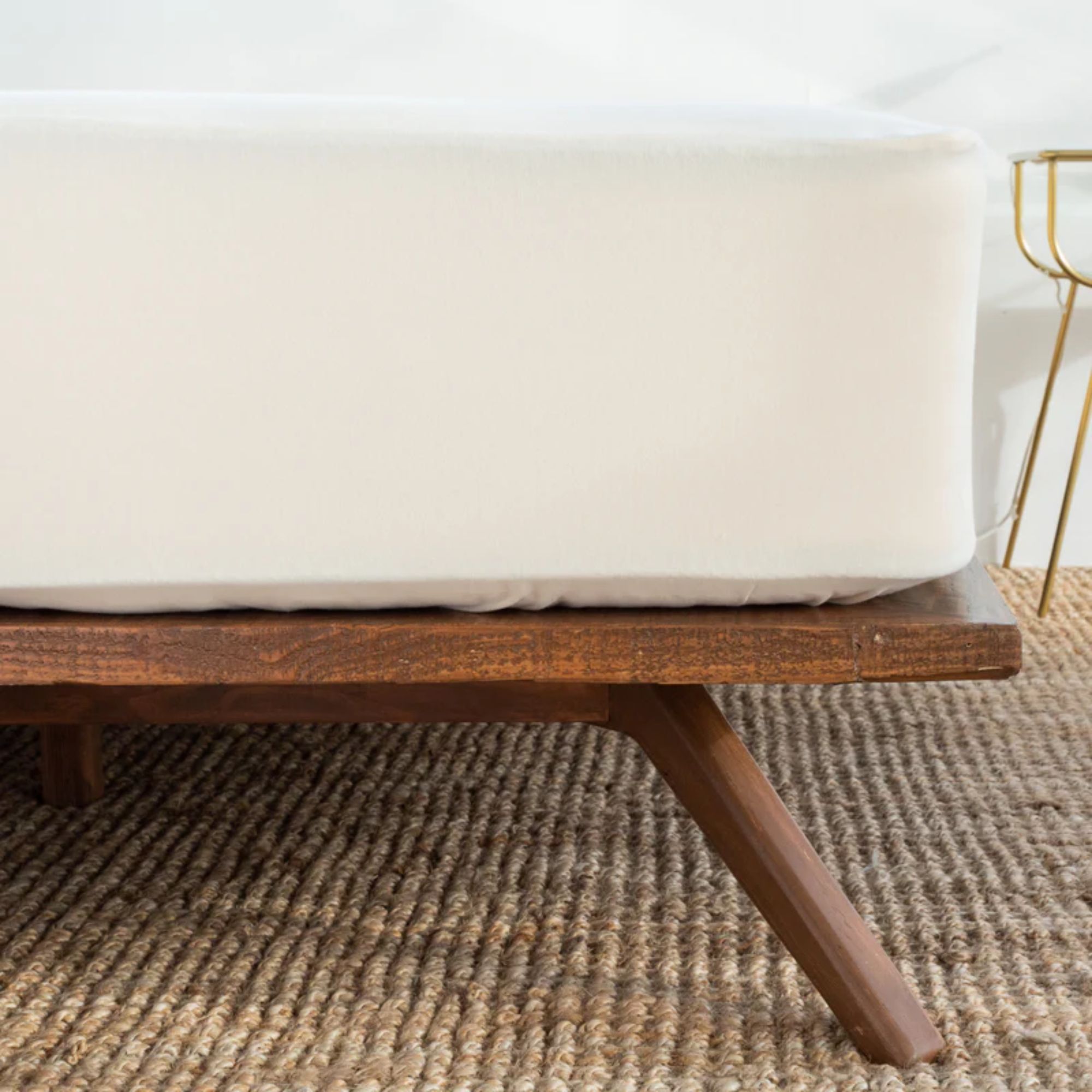The 6 Best Mattress Protectors For a Clean, Cool, Sanitized Sleep Space – Tested by Us
Keep your mattress free of dust, stains, and spillages with a handy protector that's easy to wash and comfortable to sleep on

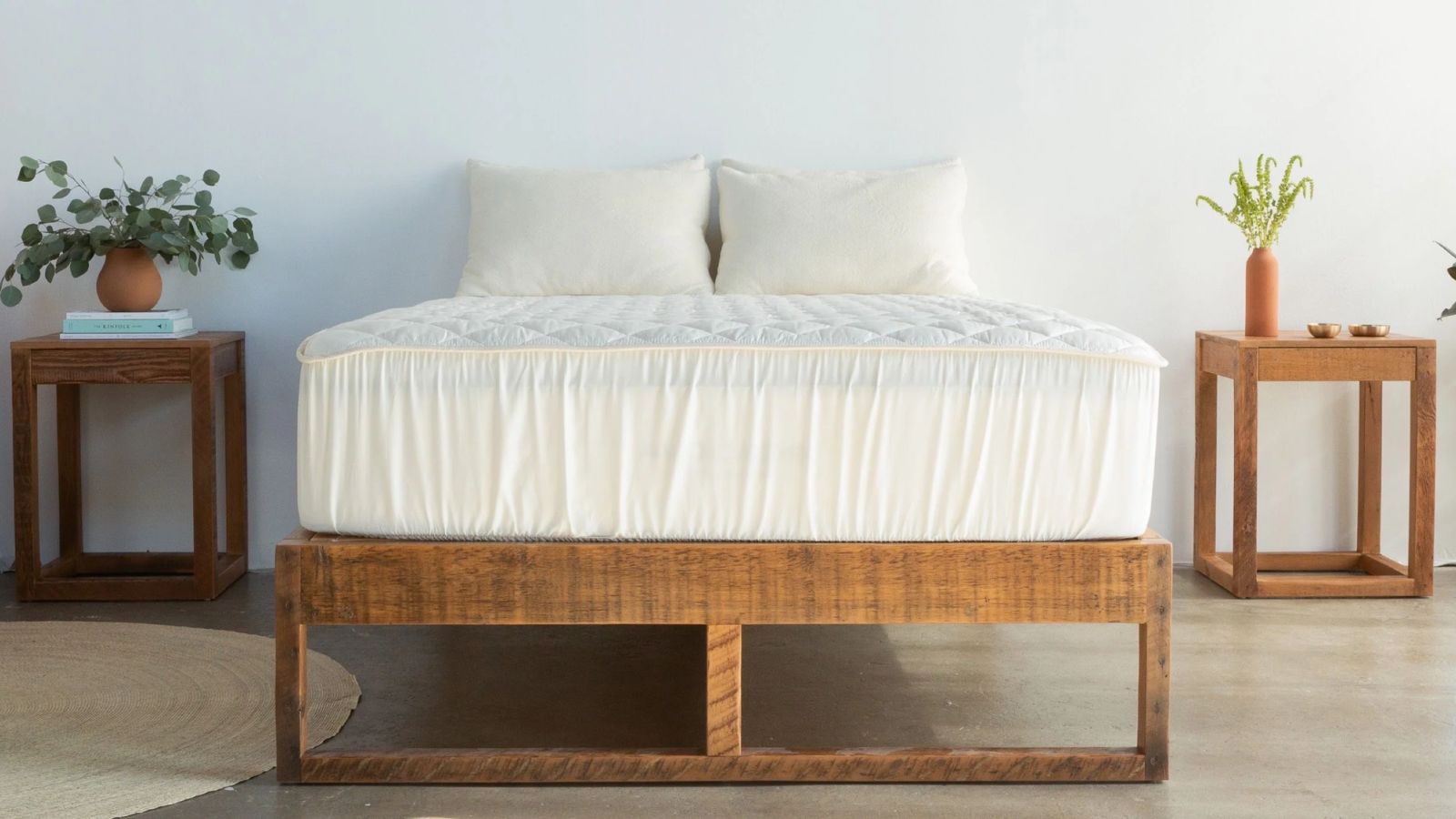
Design expertise in your inbox – from inspiring decorating ideas and beautiful celebrity homes to practical gardening advice and shopping round-ups.
You are now subscribed
Your newsletter sign-up was successful
Want to add more newsletters?

Twice a week
Homes&Gardens
The ultimate interior design resource from the world's leading experts - discover inspiring decorating ideas, color scheming know-how, garden inspiration and shopping expertise.

Once a week
In The Loop from Next In Design
Members of the Next in Design Circle will receive In the Loop, our weekly email filled with trade news, names to know and spotlight moments. Together we’re building a brighter design future.

Twice a week
Cucina
Whether you’re passionate about hosting exquisite dinners, experimenting with culinary trends, or perfecting your kitchen's design with timeless elegance and innovative functionality, this newsletter is here to inspire
23/02/26: I've swapped the Amazon Basics Mattress Protector with the IKEA GRUSNARV Protector as our 'Best Budget' mattress protector, which performed better on test. I've also updated all the prices and links, added a section on how to shop the best mattress protector deals, and improved the overall shopping experience – you can now shop our guide by clicking on the images.
Having one of the best mattress protectors, which acts as a barrier between your bed and your body, will wick away sweat, spills, and stains while keeping dust, dirt, dander, and pests, such as bed bugs, out of your mattress, protecting your investment.
Whether you go for a more affordable option or one of the top-of-the-range picks, investing in a good mattress protector is a small upfront cost that prolongs the life of your mattress. You might also be contending with an older mattress that's too hard, or has gone lumpy or saggy in all the wrong places – a protector can also provide additional comfort and support in this instance.
After months of in-depth, at-home testing and compiling reviews by our team of expert testers, the Avocado Organic Waterproof Mattress Protector delivered the best results, combining excellent waterproofing with comfort, ease of use, organic and non-toxic materials, and a noise-free surface to sleep on, all while protecting your best mattress. Other protectors deliver similar performance at far more affordable prices, so you'll find something for all budgets in our guide, depending on your priorities.
The Homes & Gardens Guide to the Best Mattress Protectors
My One-Minute Verdict
If you've got the budget to spend a little more, our best overall recommendation goes to our most expensive inclusion – the Avocado Organic Waterproof Mattress Protector – for unrivalled waterproofing without any disruptive crinkling and noise.
The SafeRest Waterproof Mattress Protector, available at Amazon, took the top spot for our best waterproof option, while the TempTune Cooling Mattress Pad is perfect for hot sleepers.
If you're after an encasement, opt for the zippered SureGuard Mattress Encasement, available at Amazon, while the Cozy Earth Bamboo Mattress Pad is our best pick for memory foam mattresses, and the IKEA GRUSNARV Waterproof Mattress Protector is brilliant on a budget.
The Best Mattress Protectors – Six Tested Options, At a Glance
Below, you'll find a bite-sized summary of each mattress protector, outlining the key pros and cons. To learn more about a particular mattress protector, keep scrolling, or skip to that section by pressing 'read more below'. There, you'll find a list of the need-to-know specs along with the further details of how we test mattress protectors.
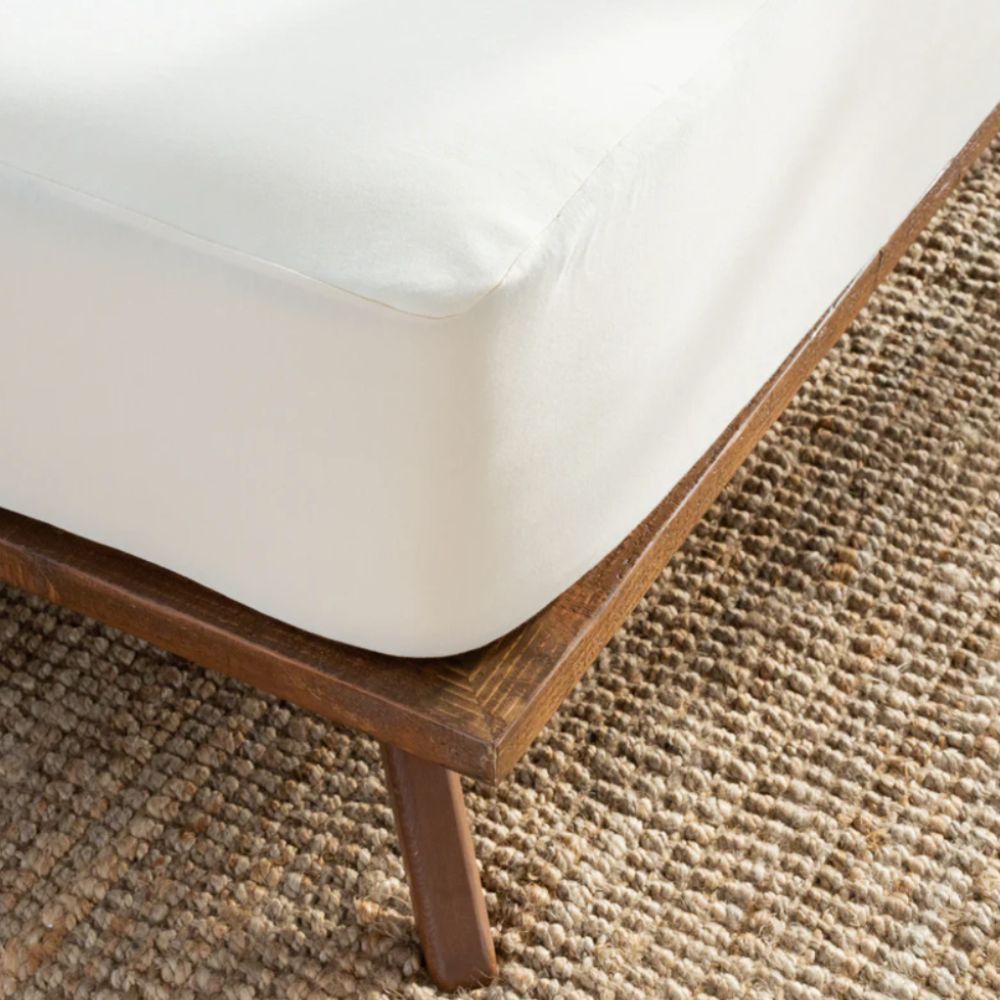
This GOTS-certified mattress protector is the most expensive option on our list, but it offers unrivalled waterproofing without crinkling and noise. Plus it's super soft and breathable, as well as being hypoallergenic and non-toxic, and, according to our tester, lives up to all of its claims, bagging it the top spot on our list.
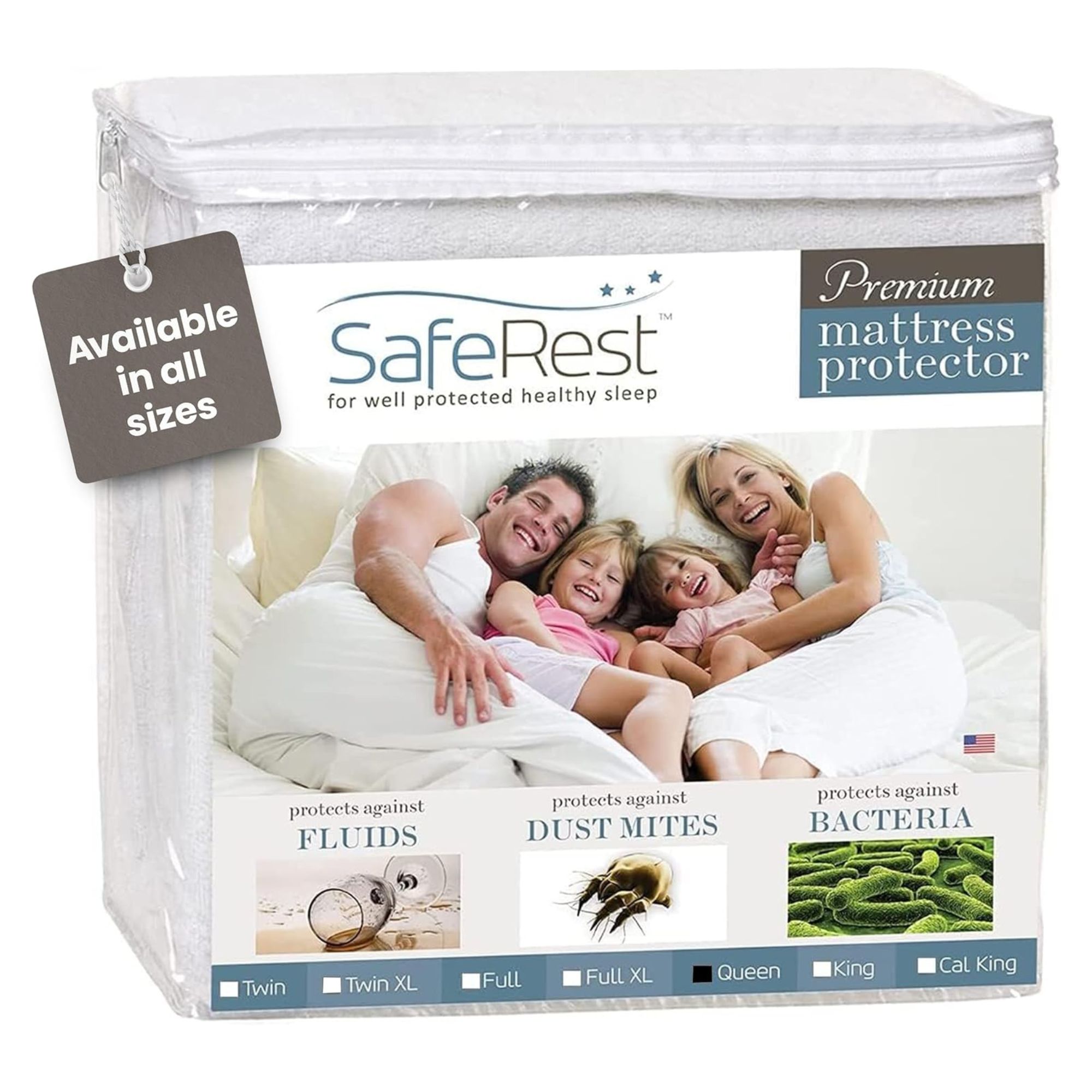
Amazon's best-selling mattress protector is made from cotton terry cloth for water resistance. Happy customers report that fluids and sweat sit on top of this mattress protector like water atop an umbrella, instead of seeping into the surface. This is what you need to protect your mattress from bed-wetting and spillages.
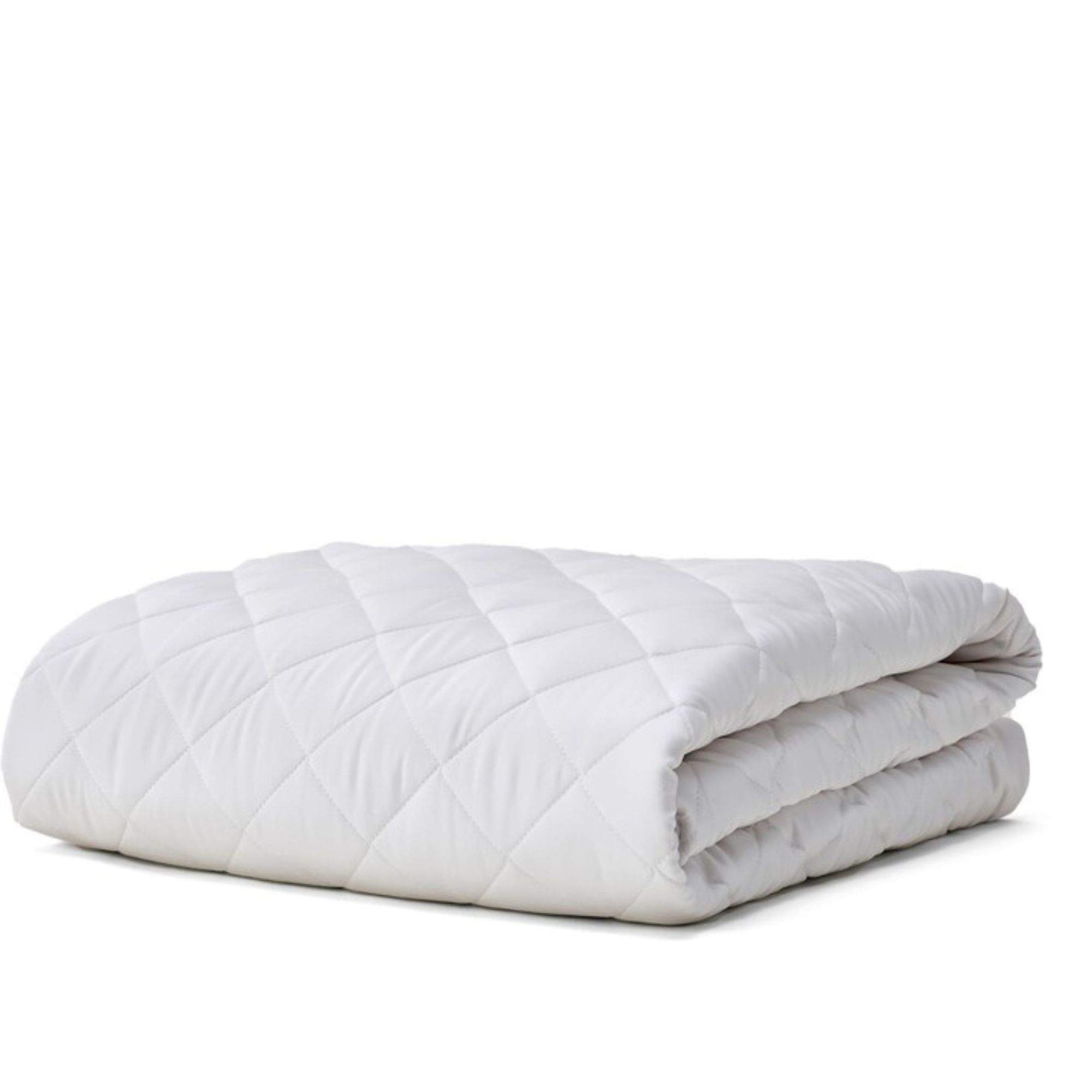
If you suffer from night sweats or hot flashes, or you live in a warm climate, then you're what's known as a hot sleeper. You need a cooling mattress protector to dissipate heat and wick moisture. This pad is threaded with SIJO Clima fibers, designed to retain and release excess body heat at strategic intervals, so you're never too hot or too cold.
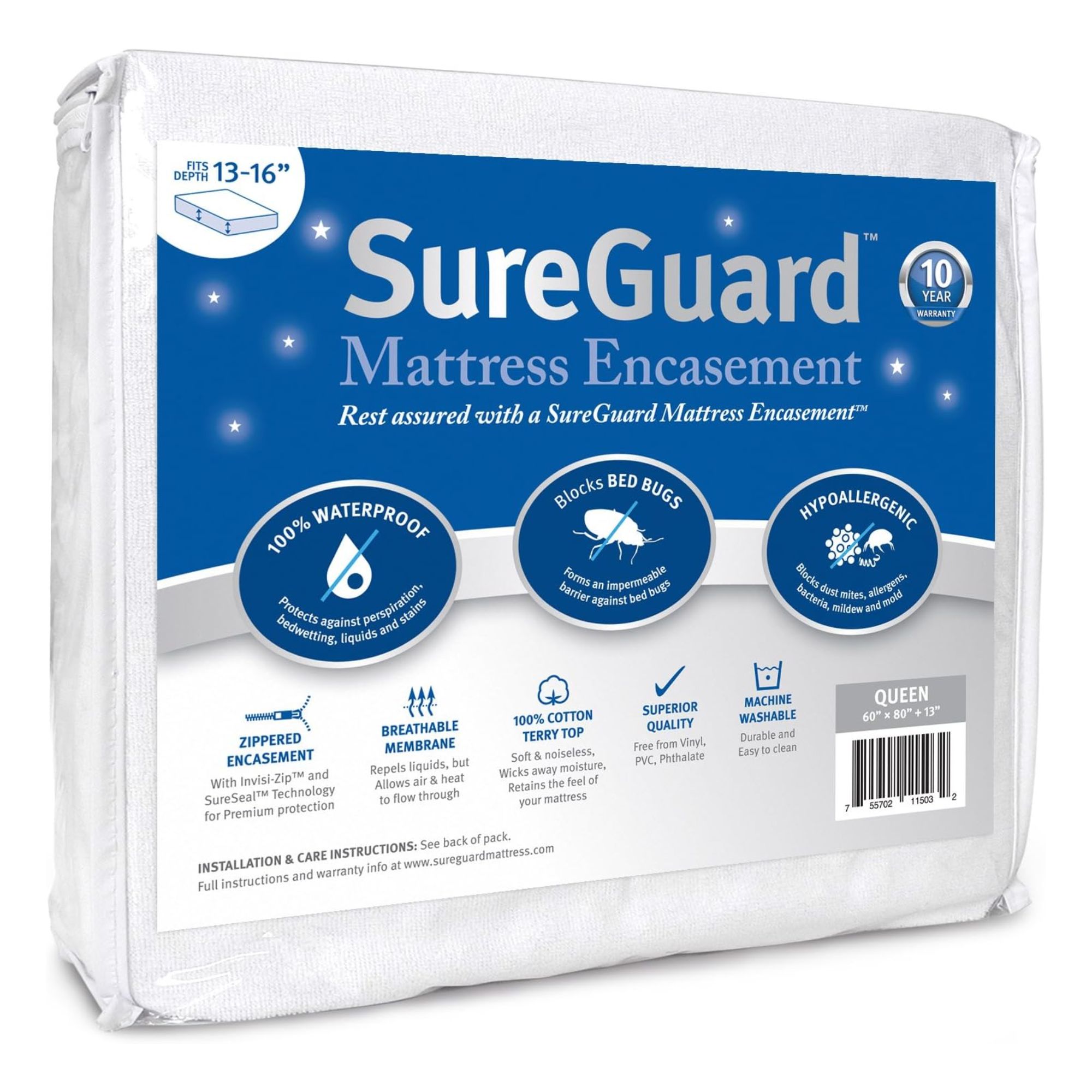
A mattress encasement is a special kind of protector, wrapping right the way around all six sides of a mattress for comprehensive protection against bed bugs and dust mites. Out of all the mattress encasements I've seen online, the SureGuard gets the best write-up, praised for its superfine zipper, soft and noiseless surface, and non-toxic construction.
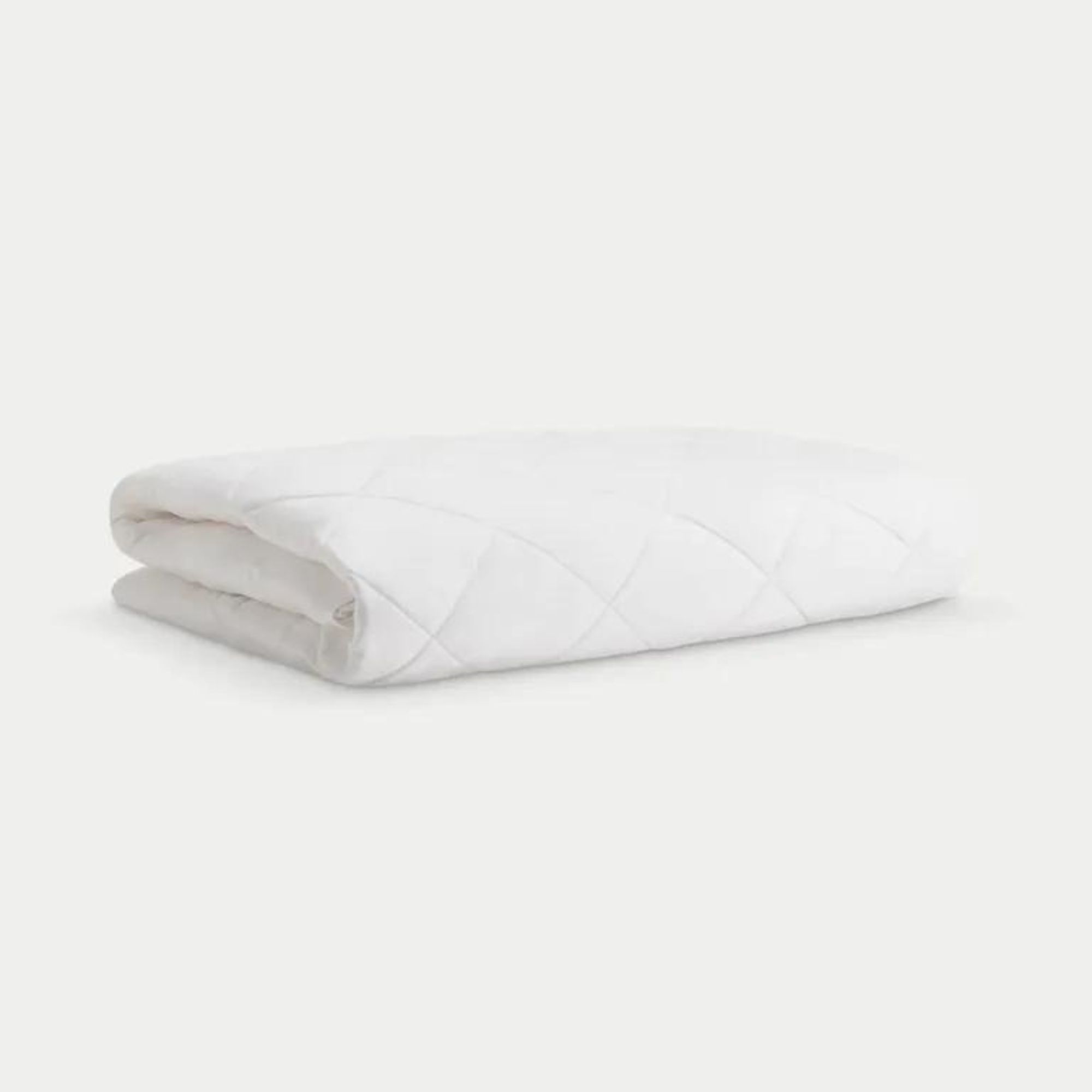
Memory foam is highly absorbent and tends to trap heat, therefore becoming a breeding ground for mold and mildew. If you're shopping for a memory foam mattress, you need a protector to wick away moisture without interrupting the body contouring effect of the foam – the Cozy Earth Bamboo Mattress Pad fits the bill.
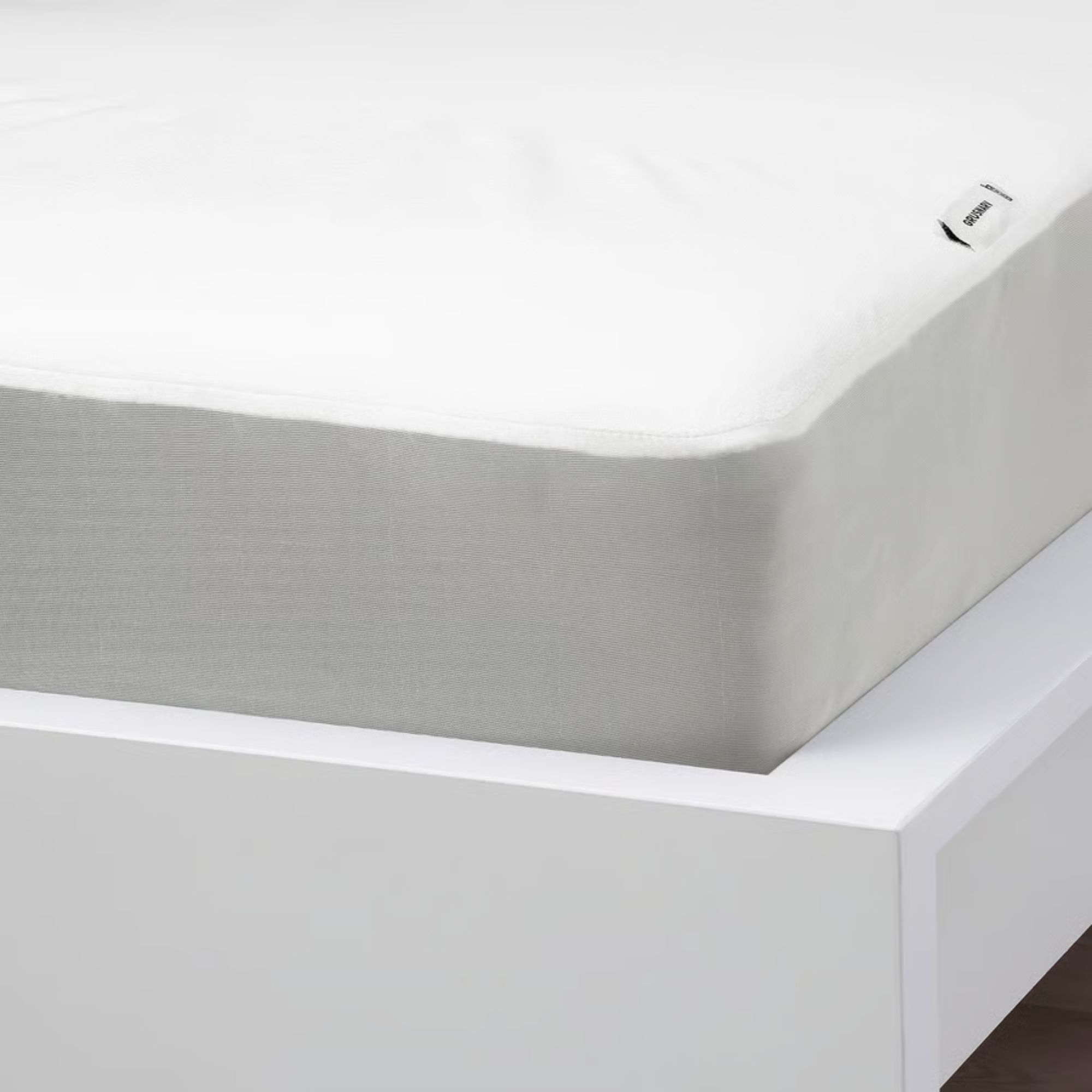
For an unbeatable price point, I found this mattress protector to be quiet, comfortable, and waterproof, and it didn't disturb my sleep at all with crinkling, slipping, or sliding. Though it doesn't feel quite as luxe as other options on this list, it's a brilliant option if you're looking for something budget-friendly.
How to Choose a Mattress Protector
A great mattress protector is an invaluable bit of bedding, so you want to get the right one the first time. Here are the most important things to bear in mind when shopping for yours:
- Waterproof vs water-resistant: A waterproof mattress protector can keep any amount of liquid from seeping through, no matter how long it sits on the surface. A waterproof mattress protector is the best choice for kids' beds or cribs where you might be dealing with overnight bed-wetting. A water-resistant mattress protector offers some protection against spills, but liquid may seep through eventually if there is a large amount or it's left for an extended period of time. A water-resistant mattress protector offers insufficient protection against bed-wetting, but it's good enough to prevent night sweats from damaging your mattress.
- Fitted sheet vs encasement: The most common mattress protector type is a fitted-sheet style, with an elastic band that stretches all around the mattress. They're easy to get on and off the bed for when you need to do the laundry. A mattress encasement is harder to get on and off the bed, but it offers 360-degree protection: On top, underneath, and around all four sides of the mattress. This is the best mattress protector type for anyone who suffers from dust mite allergies or wants to keep bed bugs out of their mattress. If you have a particularly deep or heavy mattress, you may want to think twice about buying a mattress encasement, as they can be tricky to fit on the mattress single-handedly and need to be deep enough to fit around your entire mattress, but not leave excess fabric so that it creases or sags.
- What size to choose: Many mattress protectors will come in a full range of sizes from Twin to California King, so go for your mattress size. Just like fitted sheets, mattress protectors also have skirts of different depths to accommodate various mattress thicknesses. Make sure you check the depth of your mattress and the protector's skirt length before buying, so you don't end up with one that is constantly slipping off.
- Think about thermoregulation: If you suffer from night sweats or hot flashes, or you simply tend to run a little warm, then you're what's known as a hot sleeper. You could spend thousands of dollars on a specialist cooling mattress, or you could pick up a cooling mattress protector for a fraction of the price. When you're shopping for cooling mattress protectors, steer clear of polyester: Synthetic weaves aren't as breathable as natural fibers, so they tend to trap heat. Instead, consider cotton, bamboo, eucalyptus, and even wool to dissipate heat, wick moisture, and block odors.
- Care: Most mattress protectors are machine-washable on cold and dryer-safe on low heat. Avoid high temperatures that could warp the waterproof lining and cause leaks. Make sure to check the laundry symbols on the care tag – you can also read our guide on how to clean and care for a mattress protector for more advice.
- Eco materials: If you are an eco-conscious shopper, you may want to shop for the best organic bedding and prioritise eco-friendly materials such as organic cotton, bamboo, and cornstarch-based fabrics, which are also more breathable than synthetic ones, such as polyester. Also look for GOTS-certified fabrics, and recycled fibers and fillers. While eco materials are usually a bit more expensive, they'll be worth it for the peace of mind and to keep those night sweats at bay.
- Hypoallergenic properties: A hypoallergenic mattress protector can guard against dust, dirt, and dander, as well as sweat, spills, and stains. If you've got sensitive sinuses or have pets in the house, then I suggest you buy a hypoallergenic mattress protector. Your best bet is to invest in a mattress encasement, which offers hypoallergenic protection from all angles.
| Row 0 - Cell 0 | Material | Sizes | Skirt depth | Quilted | Waterproof | Hypoallergenic |
Avocado Protector | 95% organic cotton, 5% polyurethane derived from natural cornstarch (GOTS approved) | Twin, Twin XL, Full, Queen, King, California King | 15" (standard); 22" (deep) | No | Yes | Yes |
SafeRest Protector | Cotton terry | Crib, Twin, Twin XL, Full, Queen, King, California King | 18" | No | Yes | Yes |
SIJO Mattress Pad | TENCEL lyocell, Mica nylon, recycled polyester | Full, Queen, King, California King | 18" | Yes | Yes | Yes |
SureGuard encasement | Cotton terry, polyester, polyurethane | Queen, King, California King | 6-8, 9-12, 13-16, 17-20" | No | Yes | Yes |
Cozy Earth Mattress Pad | Bamboo viscose | Twin, Full, Queen, King, California King | 18" | Yes | No | Yes |
IKEA Protector | Polyester | Twin, Full, Queen, King | 11⅞ | No | Yes | Not specified |
The Best Mattress Protector Overall
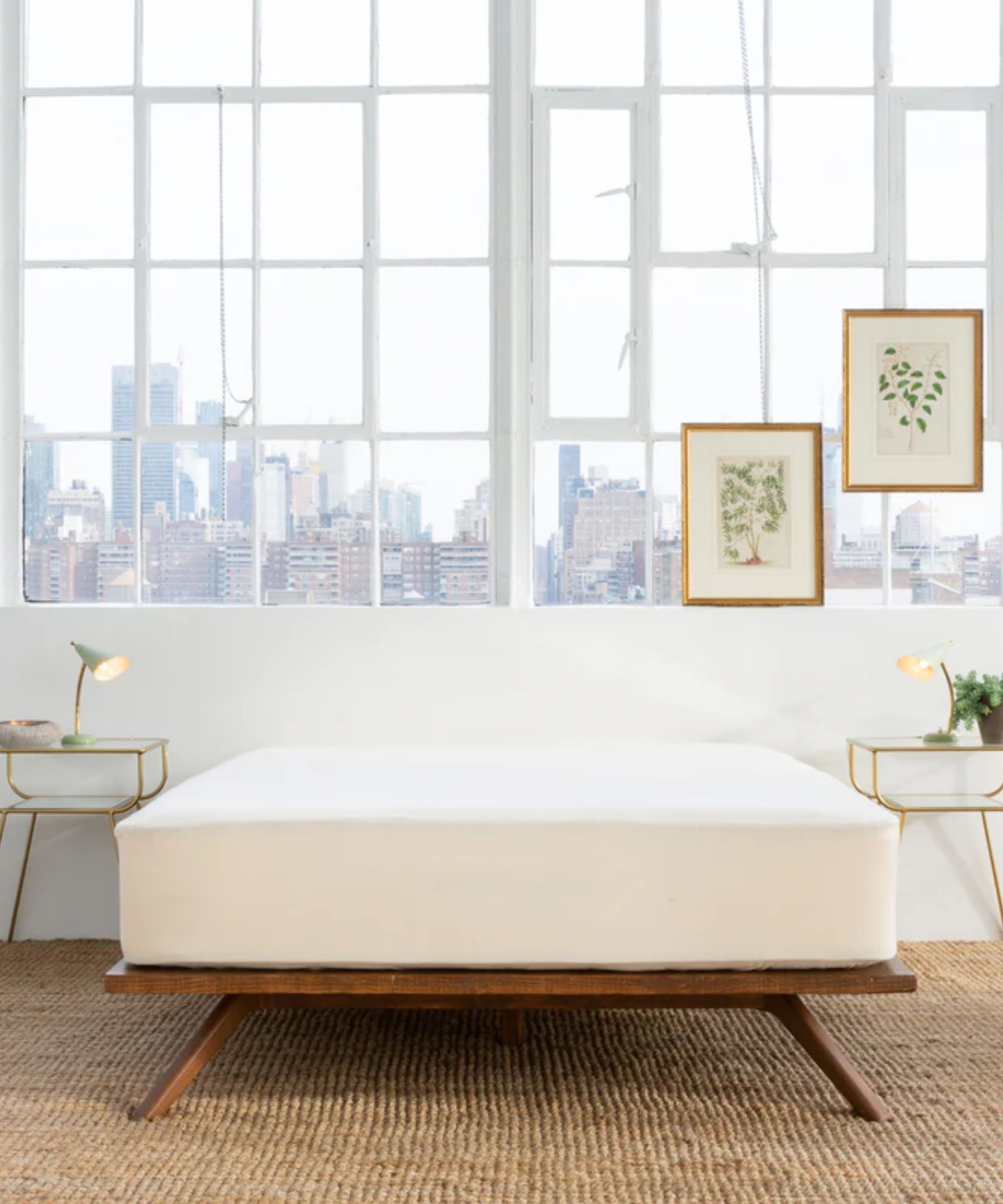
The Avocado Organic Waterproof Mattress Protector was our best on test.
1. Avocado Organic Waterproof Mattress Protector
Specifications
Reasons to buy
Reasons to avoid
Our expert tester, Alex Frost, says, 'The Avocado Organic Waterproof Mattress Protector is everything you’d hope for in a product that you really need to just do its job, without causing any additional issues.'
Put simply, you want a mattress protector to keep your expensive mattress free from damage and stains, without disturbing your sleep. 'This one is highly reliable and doesn’t let anything leak through – even when I poured a glass of water directly on top of it to test out its promises,' confirms Alex. 'It’s also much easier to make the bed now, as the deep pocket options give more than enough fabric to make it around the sides, with some room to spare.'
The 'washable, breathable, non-toxic' protector has been tested for PFAS chemicals and has a MADE SAFE certification for non-toxic standards, so if that's important to you, this will be a good investment.
'It is also actually quiet, which is the opposite of some cheaper options that crinkle while you roll around at night,' adds Alex. 'Instead, this feels closer to a thinner version of one of the best mattress toppers, in that it’s a super soft, luxurious fabric, and breathable.'
Over 1,000 online reviews on Avocado’s site show this is a high-quality product, with 4.7 stars across those reviews. 'Though this mattress protector is pricier than some, at $219 (at full price) for a Queen standard pocket, it’s worth the extra money in the long run,' Alex advises. 'As someone with five kids, I can attest to the fact that choosing a good mattress protector is an investment that’s important to make, especially if bedwetting or bedtime snacks are at risk of ruining your mattress.'
If you're working with a tighter budget, then I suggest you skip Avocado and shop the SafeRest Waterproof Mattress Protector, available at Amazon, instead.
You get a one-year warranty with the Avocado Organic Waterproof Mattress Protector, which should be plenty of time to find any faults with materials and manufacturing.
Also, you get a 100-night trial window and free shipping, although it's worth noting that returns are not free.
Attribute | Notes | Score (out of 5) |
|---|---|---|
Comfort | Standard and deep pocket options | 5 |
Noise levels | Really quiet | 5 |
Waterproofing | No water penetrated even when a whole glass was poured on top | 5 |
Thermo-regulation | Organic cotton offers natural breathability | 5 |
Ease of care | Machine-washable and dryer-safe | 5 |
The Best Waterproof Mattress Protector
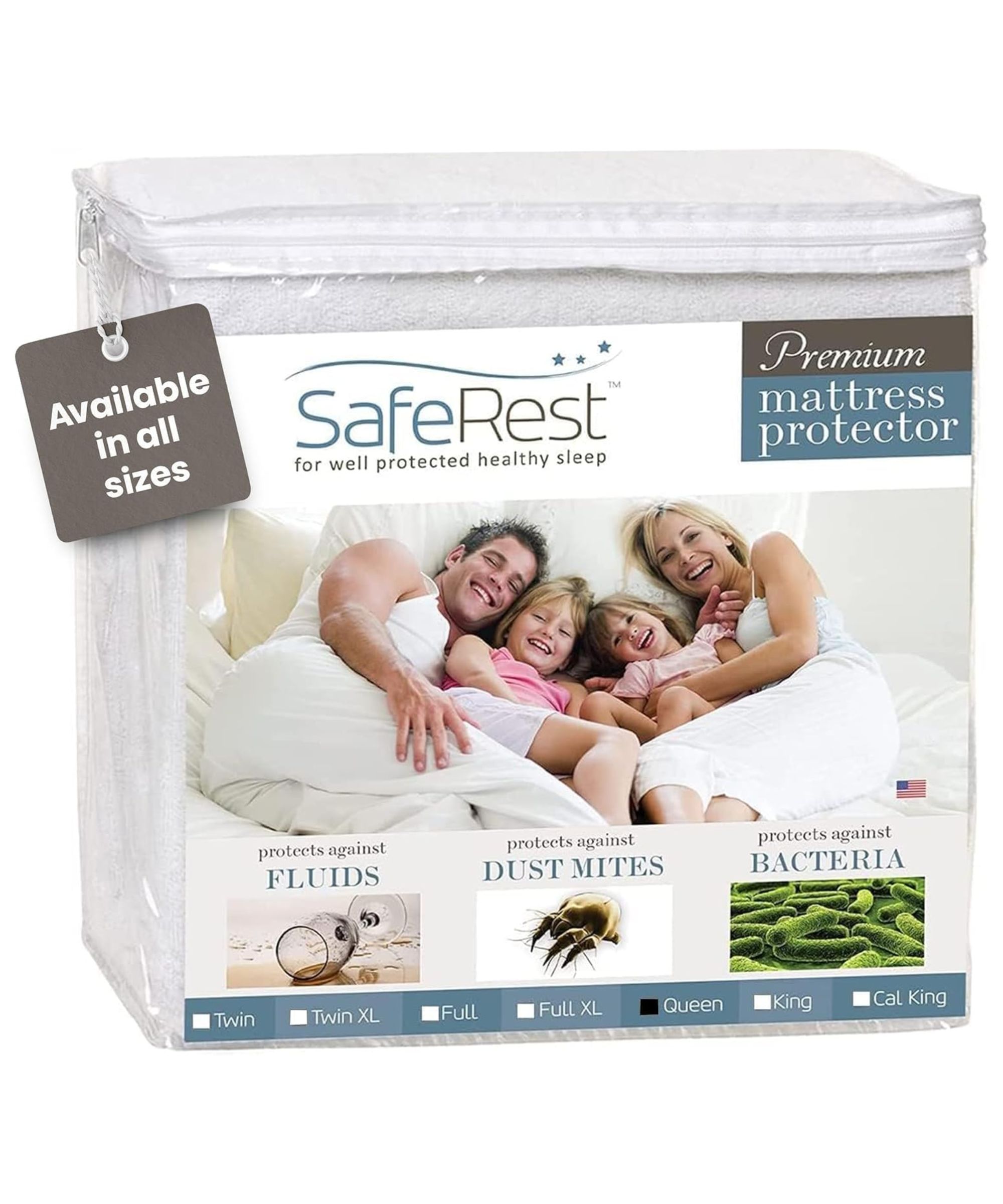
The SafeRest Waterproof Mattress Protector, available at Amazon, is perfect for instances where you need durable, reliable protection, and it's affordable, too.
2. SafeRest 100% Waterproof Mattress Protector
Specifications
Reasons to buy
Reasons to avoid
This is Amazon's number-one best-selling mattress protector, with more than 200,000 five-star reviews from verified customers. Here's a snippet from one review: 'When my wife was pregnant, her water broke on our bed − Niagara Falls levels of water breaking – and thanks to the SafeRest 100% Waterproof Mattress Protector, our mattress stayed bone dry. Don't know how to give a better recommendation than that!'
Another, left by Kevin C., tells a similar story, 'My wife went into labor a year and a half ago, and that labor went very quickly....so quickly that she ended up giving birth on our bed in the presence of EMTs. We then went to the hospital, where I stayed overnight with my wife and new baby girl. The next day, once things had calmed down, I went home to clean up before they came home.
'Let's just say I was fully expecting to be purchasing a new mattress. To my amazement, once I'd bagged our sheets and this mattress pad, our mattress was perfectly fine. I bought another one immediately and will continue to use this brand as long as it exists. I challenge anyone to put it through a more rigorous test.'
A third shopper, MJ, bought it after reading such reviews, and assures it's 'worth the money. There was one review on here that stated his wife's water broke, and the mattress was dry. Based on that, I ordered it. We have had it for years, and with pet accidents and drink spills, it has kept our mattress in perfect condition.
'It has been washed a million times and still works fine...Great quality and perfect for a thicker mattress. It never rolls up or has any problems with it staying put.'
So, Amazon shoppers love the SafeRest Waterproof Mattress Protector, as does our expert tester, Jaclyn Turner.
'I like the soft feel of cotton terry cloth through my fitted sheets,' says Jaclyn. 'There's none of the squeaky slipperiness you get from synthetics. As a light sleeper, I appreciate that the SafeRest Mattress Protector is noiseless in the night, thanks to an ultra-thin layer of waterproof materials.'
'As a hot sleeper, my only complaint is that the terry cloth material doesn't make the best thermoregulator,' says Jaclyn, 'though it's great for moisture-wicking. If you're looking for an actively cooling mattress protector, I suggest the SIJO TempTune Mattress Pad.'
SafeRest recommends their mattress protector as an Airbnb essential for hosts to keep their guest bedrooms clean. Given the low price of the protector (less than $50 for a Queen at full price), I'd say it's also a great option for first-time homeowners and buyers on a budget.
Attribute | Notes | Score (out of 5) |
|---|---|---|
Comfort | Comfortable terry cloth | 5 |
Noise levels | Silent | 5 |
Waterproofing | Best in class | 5 |
Thermo-regulation | Not as breathable as natural materials | 3 |
Ease of care | Machine-washable and dryer-safe | 5 |
The Best Cooling Mattress Protector
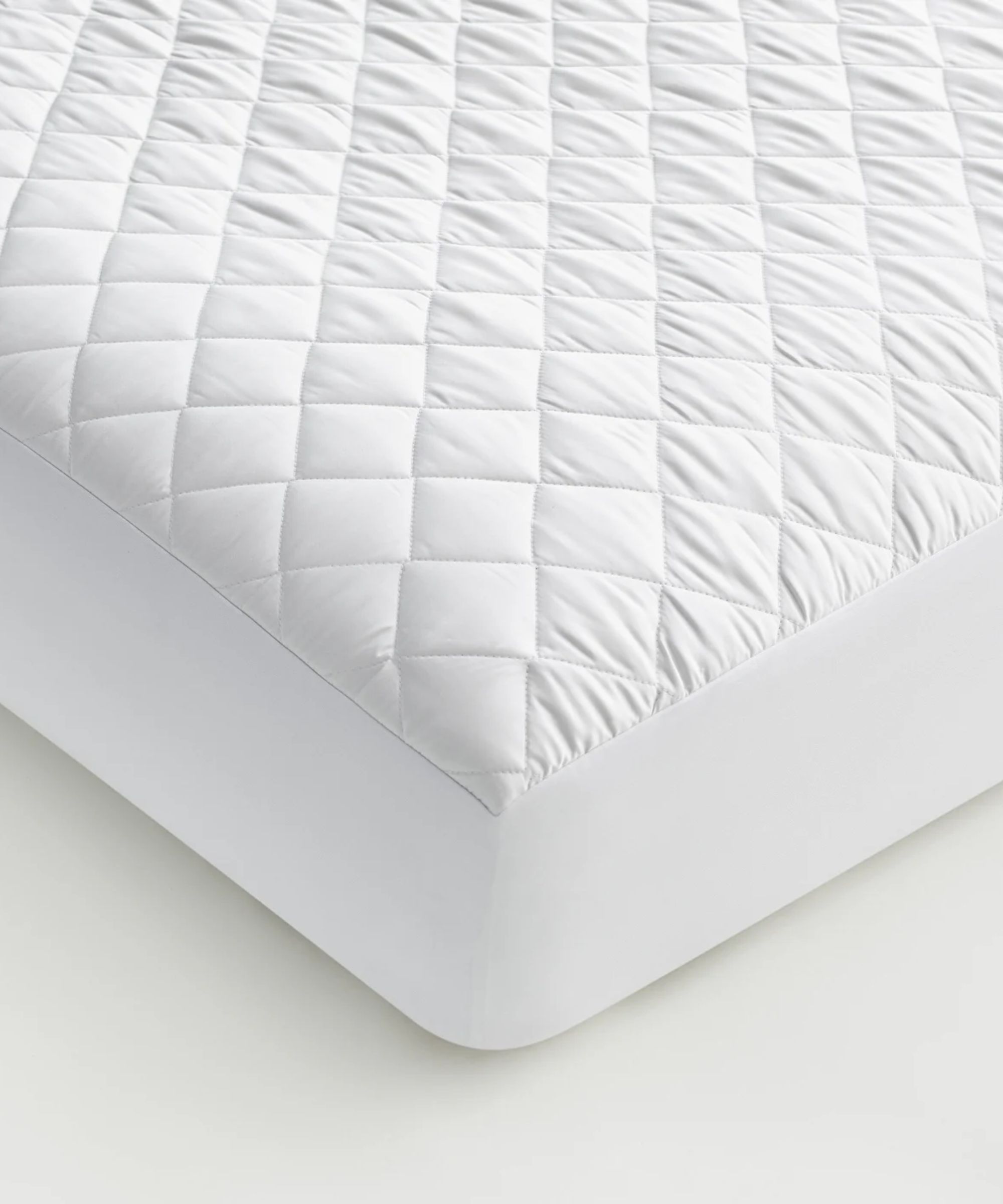
The SIJO TempTune Cooling Mattress Pad is perfect for hot sleepers.
3. SIJO TempTune Cooling Mattress Pad
Specifications
Reasons to buy
Reasons to avoid
The best cooling mattress toppers and pads are designed to dissipate heat, wick moisture, and block odors. Out of all the entries in our buying guide, the SIJO TempTune Cooling Mattress Pad offers the best performance at the fairest price, and can accommodate mattresses up to 18 inches deep.
Our expert tester, Louise Oliphant, is a hot sleeper who suffers from night sweats. 'The SIJO TempTune Cooling Mattress Pad works to make my bedroom much more comfortable,' she says. 'It's filled with thermoregulating fiberfill to cool me down and lined with a moisture-wicking membrane to absorb sweat. I worried that the waterproof layer would make an unpleasant squeaking sound when I switched positions in the night, but so far, it's noise-free.'
Before you buy, it's worth knowing that SIJO only makes mattress pads in sizes Full, Queen, King, and California King. If you're looking for a cooling mattress protector with a similar look and feel to fit a smaller bed, then I recommend the Cozy Earth Bamboo Mattress Pad.
Out of all the mattress protectors on this list, the SIJO TempTune Cooling Mattress Pad is one of the most expensive, retailing at $175 for a Queen. I think it's worth the money, but you could always shop the bedding sales to save some cash.
Attribute | Notes | Score (out of 5) |
|---|---|---|
Comfort | Quilted top | 4 |
Noise levels | Silent | 5 |
Waterproofing | Waterproof membrane inside the protector | 5 |
Thermo-regulation | Best on test | 5 |
Ease of care | Machine-washable and dryer-safe | 5 |
The Best Mattress Encasement
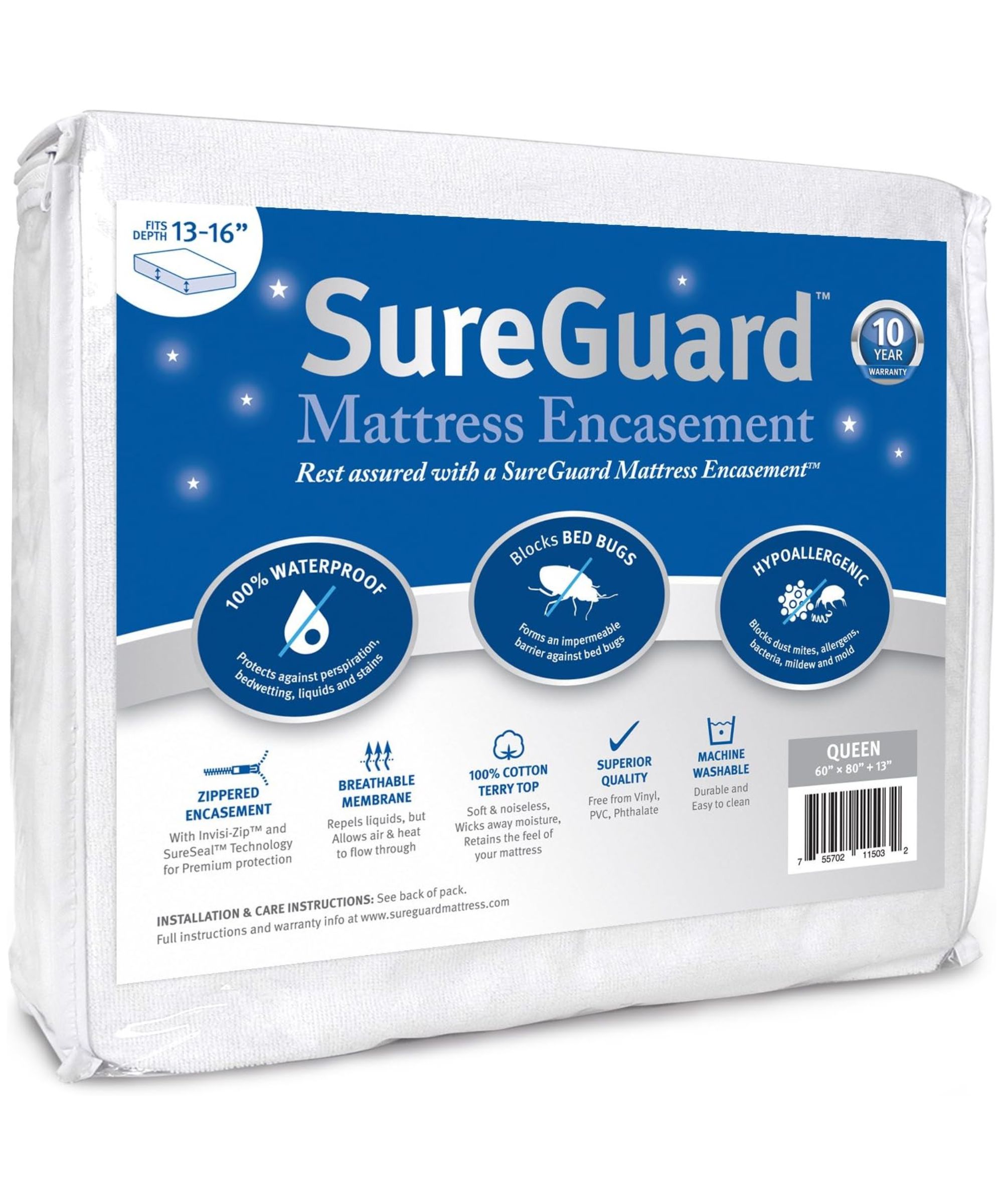
The SureGuard Mattress encasement, available at Amazon, offers complete protection on all sides. Click the image to shop.
4. SureGuard Mattress Encasement
Specifications
Reasons to buy
Reasons to avoid
Even the best mattress protector only covers part of your mattress: The top and the four sides. But, in order to properly protect your mattress from bed bugs and dust mites, you need an encasement to offer 360-degree coverage.
Out of all the options on Amazon, the SureGuard Mattress Encasement boasts the best customer rating, with a 4.6/5 average from more than 6,300 verified reviews.
'Worth the money and well made,' reads one recent review from verified shopper Nathan Hernandez. 'Was a little tough to put on my mattress, but that was because it was only me putting it on, plus standing the mattress up vertically was barely shorter than my ceiling, so it took some finagling. Fits snug onto the mattress and has a nice two-textured feel to it.'
Unlike a lot of the protectors on this list, the SureGuard Mattress Encasement, available at Amazon, comes in a range of depths to accommodate thick and thin mattresses alike – you can choose between four different 'pocket' sizes, from 6" to 20".
There are a few more mixed reviews, most of which mention that the encasement is hard to put on. But, one-star ratings account for only four percent of all the reviews, two-star for one percent, three-star for four, four-star for 12, and the rest, the overwhelming majority, are five-star, equalling 79 percent of the total.
That being said, you'll need to maneuver your mattress off the bed frame, wiggle it into the case, and zip it all the way around before you put it back on the bed.
If you live alone and you struggle to lift heavy weights, you'll need to ask a friend for help; otherwise, opt for a classic mattress protector.
Attribute | Notes | Score (out of 5) |
|---|---|---|
Comfort | Range of pocket depths to suit all standard mattress sizes | 5 |
Noise levels | Reviews indicate silent sleep | 5 |
Waterproofing | Reviews indicate promising performance | 4 |
Thermo-regulation | Not quite as breathable as natural materials | 3 |
Ease of care | Machine-washable and dryer-safe | 5 |
The Best Mattress Protector for Memory Foam Mattresses
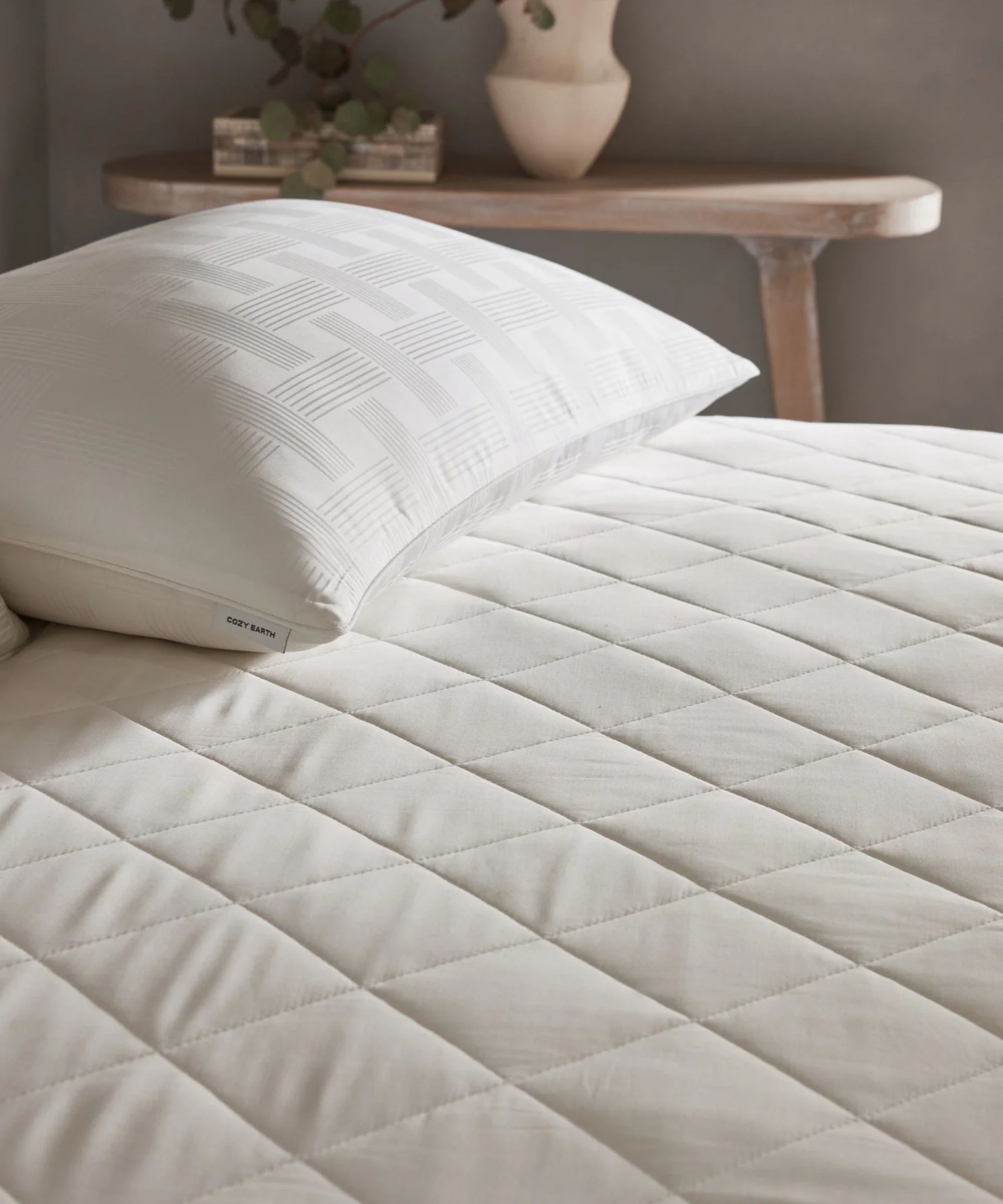
The Cozy Earth Bamboo Mattress Pad is the perfect solution to keeping memory foam mattresses cool and comfortable.
5. Cozy Earth Bamboo Mattress Pad
Specifications
Reasons to buy
Reasons to avoid
Like any mattress type, a memory foam mattress has its pros and cons. The body contouring effect of slow-moving foam offers targeted pressure relief to ease your aches and pains. You want your mattress protector to be thin enough that you still feel the benefit of the foam. Ideally, you want it to be thermoregulating to counteract the heat retention of dense foam. The Cozy Earth Bamboo Mattress Pad fits the bill.
Naturally moisture-wicking and antimicrobial, this bamboo mattress pad is designed to combat night sweats and bust the bacteria that breed in warm, damp environments, like beds. I started testing the Cozy Earth Bamboo Mattress Pad earlier in the year and really noticed a difference in my bed and body temperature during the warmer months.
I sampled the Cozy Earth Bamboo Mattress Pad alongside the Bamboo Comforter and Bamboo Duvet Cover. These pieces feel soft and silky, but it's the bamboo mattress pad that puts in the hard work. I never woke up from the sound of polyester rustling, nor could I feel any ridges or hard edges through my fitted sheet.
The thing I like best about the Cozy Earth Bamboo Mattress Pad is the slim fit – thick enough to add some plush comfort to your mattress, but not so thick that it starts to stretch your fitted sheet.
A few final points: The Cozy Earth Bamboo Mattress Pad comes in the standard sizes, from Twin to California King, except for Twin XL. If you're looking to buy the best mattress protector that's suitable for dorm room ideas, you'll likely need to shop elsewhere – I recommend the Buffy Plushy Mattress Protector, which is one of my honorable mentions included in this guide.
Also, this Cozy Earth mattress pad never claims to be waterproof, only water-resistant. To ward against sweat and stains, I recommend the SafeRest 100% Waterproof Mattress Protector.
Attribute | Notes | Score (out of 5) |
|---|---|---|
Comfort | Adds a plush finish to your mattress | 5 |
Noise levels | Silent | 5 |
Waterproofing | Only water-resistant | 2 |
Thermo-regulation | Naturally thermo-regulating | 5 |
Ease of care | Machine-washable and dryer-safe | 5 |
The Best Budget Mattress Protector

The IKEA GRUSNARV Mattress Protector is impressively affordable.
6. IKEA GRUSNARV Mattress Protector
Specifications
Reasons to buy
Reasons to avoid
A mattress protector is an invaluable bit of bedding to keep your bed clean and prolong the life of your mattress. You shouldn't have to spend a small fortune to get good sleep. When you buy the IKEA GRUSNARV Waterproof Mattress Protector, you don't have to – this budget-friendly option covers all the bases.
On test, I was impressed with this affordable pick. It's quiet, didn't slip or slide in the night thanks to the strong elastic edging, and held up well when I poured a cup of water on it to test its waterproof capabilities, leaving my mattress below dry. For day-to-day use, it's definitely suitable and offers more than enough protection.
It's not the most luxurious of the bunch, and doesn't boast any premium materials or plush padding for added comfort. But, at just $24.99 for a Queen, it's the one I'd recommend if you're after something that does its job well, without any additional bells and whistles to drive up the price.
The only thing to note is that the IKEA GRUSNARV Waterproof Mattress Protector is made from polyester, which tends to trap heat. I haven't noticed any issues with this at all (though I'm not a hot sleeper), but for an eco-friendlier option that will keep you cool, I recommend the Avocado Organic Waterproof Mattress Protector.
Attribute | Notes | Score (out of 5) |
|---|---|---|
Comfort | Thin, but barely noticeable | 4 |
Noise levels | Silent | 5 |
Waterproofing | Effective protection from everyday spills and leaks | 4 |
Thermo-regulation | Not as breathable as natural materials | 4 |
Ease of care | Machine-washable and dryer-safe | 5 |
Best Mattress Protectors − Honorable Mentions
Of the many mattress protectors our expert team has tested, our top six represent the best for comfort, waterproofing, thermoregulation, and ease of care for a range of needs. However, the three below also deserve a mention and may suit your needs better than our selection.
- Buffy Plushy Mattress Protector: Inside this mattress protector, you'll find fibers from plastic bottles, upcycled and spun into super-soft fiberfill. That's why the Buffy Plushy Mattress Protector feels more like a mattress pad, and could add some plush comfort to a firm mattress. Normally, I wouldn't recommend a plasticky mattress protector for hot sleepers, but our tester, Emilia Hitching, who suffers from night sweats, found that it helped keep her mattress cool. The only reason the Buffy Plushy Mattress Protector didn't make the main buying guide is that it's water-resistant, rather than waterproof.
- Coop Home Goods Waterproof Mattress Protector: Amazon is one of the best places to buy bedding − but only if you know how to shop there. I had to sift through hundreds of plasticky protectors with terrible reviews to reach the Coop Home Goods Mattress Protector, but I'm so glad I did. With more than 5,000 verified five-star ratings and an RRP of just $59 for a Queen, it offers a great balance of quality and cost. There are a handful of mixed reviews, most of which concern the thermoregulation (or lack thereof). Hot sleepers would do better with one of the best cooling mattress protectors, such as the SIJO TempTune Mattress Pad.
- Nolah GlacioTex™ Cooling Mattress Protector: Retailing at $209 full price for a Queen, you may well be able to pick this up for under $150 during sale periods. Unlike thick and plasticky mattress protectors, this is made from a lightweight blend of polyester and polyethylene. These fibers boast high thermal conductivity to carry heat away from your body and out of your bed. The fabric features a soft weave for a touchable texture through your bed sheets and is designed to fit beds up to 15 inches thick.
How We Test Mattress Protectors
Our team of expert testers represents a wide range of ages and sleep styles, and live right across the country in warm, cool, and temperate climates. Together, we test mattress protectors for at least 30 nights in our own homes before we write our reviews. This should give an accurate indication of long-term performance. To learn more about how we test at Homes & Gardens, consult our expert guide.
We assess each mattress protector against the same criteria: Comfort, noise levels, waterproofing, thermoregulation, and ease of care. To assess comfort, we layer the mattress protector beneath our fitted sheets and lie on the bed to consider how it feels, and whether there are any uncomfortable ridges or slippery sections. To assess noise levels, we move around the mattress, listening for the tell-tale squeaks of a synthetic waterproof lining. To assess waterproofing, we pour a cup of water on the mattress protector to see whether it seeps through the fabric or settles on top.
To assess thermoregulation, we switch off our AC before we sleep, making note of any times we wake up in a sweat. To assess ease of care, we clean the mattress protector according to the manufacturer's instructions, monitoring how the performance changes before and after each clean.
We also consider the practicalities of buying a mattress protector, from the range of sizes on offer to the details of delivery. We like to compare our findings against verified reviews to pick up common customer concerns. Finally, we bring it all back to the price to help you determine value for money.
Meet the Testers

Jaclyn is Homes & Gardens' former eCommerce Editor and sleep expert, having passed our five-step certification process to become a verified customer advisor on mattresses. She is a huge advocate of the importance of getting eight hours' sleep and having the best mattresses and bedding to support that.

Alex is a Cincinnati-based product tester who has slept on dozens of mattresses and toppers. She's a side and stomach sleeper, with a long history of chronic but controlled back and hip pain issues, so she is always on the lookout for the most supportive sleep products.

Louise is one of our former Sleep Editors. As a hot sleeper and an eco-conscious shopper, she likes natural latex to regulate her temperature.

Emilia is Homes & Gardens' former Sleep Editor and led a team of experienced testers based around the globe, so they could, together, bring readers the most informative and honest reviews to help you buy well.
How to Shop Deals On the Best Mattress Protectors
Usually, you'll be able to get the deepest reductions on the best mattress protectors on Black Friday, the last Friday in November, and Cyber Monday, the first Monday in December. Almost all our favorite retailers slash their prices site-wide, and these sales usually last at least two weeks. If you don't see an obvious sale section, check your email inbox for a promo code, or look for them in banners and pop-ups on the site page.
If you miss that sale period, I also tend to spot good reductions in the January sales, and Federal Holidays, such as Presidents' Day (which fell on 16 February this year), and the Fourth of July.
For any retailers available on Amazon, you'll also be able to shop them at a discount during Amazon Prime Day, which usually falls in mid-July, and Amazon's Big Deal Days, an exclusive two-day shopping event for Prime members, which took place in October last year.
FAQs
What Sort of Mattress Protector is Best?
There are lots of different mattress protector types. Which is best for you depends on your specific needs. Here's a quick overview of the pros and cons of the most common mattress protector types:
- Zippered: Also known as a mattress encasement, a zippered mattress protector is best for anyone who is allergic to dust. When you enclose your mattress in a zippered protector, you get 360-degree safeguarding against dust mites and bed bugs.
- Fitted: If you're buying for a crib or kids' bed, you want a mattress protector that you can quickly whip on and off the bed to clean up overnight accidents. A fitted sheet style is best: You can take it off in seconds.
- Synthetic: As a general rule, synthetic materials are less absorbent than natural fibers, so they're better for waterproofing.
- Organic: Natural fibers, such as wool and cotton, are more breathable than synthetic substances, and they're far more environmentally friendly.
Are Expensive Mattress Protectors Worth It?
I would consider any mattress protector that costs more than $100 for a Queen to be an expensive mattress protector. Our reigning champion, the Avocado Organic Waterproof Mattress Protector, comes in at $219 (full price – although it is often knocked down in the sales), which certainly qualifies as expensive.
But if you have just invested in an expensive brand-new mattress that you want to keep in pristine condition, or are looking for more than just basic waterproofing, you will appreciate the added benefits of this option, such as organic, breathable, and hypoallergenic materials.
Before you start to shop, I suggest you set an upper and a lower limit to your budget to give yourself a guide of what you're prepared to spend.
Can You Machine Wash a Mattress Protector?
Yes: Most mattress protectors are machine-washable on cold and dryer-safe on a low heat. Some, like the Avocado Organic Waterproof Mattress Protector, will require washing before use to shrink it to the right size for your mattress. Always check the instructions on the care tag beforehand to ensure your mattress protector performs at its best for as long as possible.
Do You Put a Bed Sheet Over a Mattress Protector?
Yes, a mattress protector goes directly on top of your mattress or mattress topper and beneath your sheets. In fact, a mattress protector works a lot like a fitted sheet – you need to stretch the elasticated skirt over each corner of the mattress.
Which Mattress Protector is Best for Bed Bugs?
A mattress protector is also the first line of defense against bites from bed bugs and other allergies caused by dead skin cells, pet dander, and other irritants reaching your mattress. However, bed bugs can get through openings in a mattress protector.
To avoid this happening, opt for zippered or encased mattress protectors, like the Sureguard Mattress Encasement, which will bring 360-degree protection and peace of mind.
It's also important to keep your mattress clean, which is why a mattress protector should be the first thing you buy following the purchase of a new mattress, especially if you want to keep these pests at bay.
After some more actionable advice? Learn how often you should wash a mattress protector, and how to fold a fitted mattress protector in our dedicated guides.
Design expertise in your inbox – from inspiring decorating ideas and beautiful celebrity homes to practical gardening advice and shopping round-ups.

Ottilie joined Homes & Gardens in 2024 as the News Writer on Solved, after finishing a Master's in Magazine Journalism at City, University of London. Now, as the Sleep Editor, she spends her days hunting deals and producing content on all things sleep – from mattresses and sheets to protectors and pillows, all of which she tests in her own home. She also has particular expertise in home fragrance, covering everything from candles to reed diffusers.
Previously, she has written for Livingetc and Motorsport Magazine, and also has a Master's degree in English Literature and History of Art from the University of Edinburgh, where she developed a love for inspiring interiors and architecture.
- Emilia HitchingSleep Editor
- Katrina Harper-LewisHead of Living
